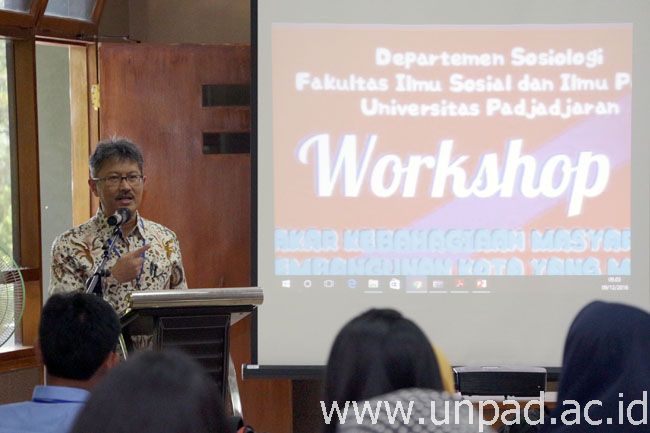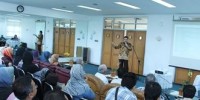[Unpad.ac.id, 9/12/2016] Massive construction of the face of Bandung in the last two years gained public appreciation. Recovery of public space area was able to increase the value of its people happiness index of 70.6 in 2015. That amount increased 2 points from the previous 68.23 in 2013. The achievement of this happiness index increase is also triggered the analysis of academics.

Vice Chancellor for Academic Affairs and Learning Unpad, Dr. Arry Bainus, M.A., said that the increase in the index value would need to be coupled with the implementation of cultural values. Such was said by Dr. Arry at a keynote speech at the Workshop “Measuring the Happiness Community in City Development Pluralistic Society” at the Graduate Campus of FISIP Universitas Padjadjaran, Bandung, Friday (9/12). This workshop was held by the Department of Sociology, Faculty of Social and Political Sciences, Universitas Padjadjaran.
Dr. Arry said that the development of Bandung should also be based on the measurement of Gross National Happiness (GNH). This method was developed by the King of Bhutan, Jigme Singye Wangchuk, in 1972. There are four pillars of GNH ratings measured in, namely sustainable development, transparency of government, the preservation of cultural values, conservation of the natural environment.
Actually, the implementation of cultural values has been embraced strongly by the people of Indonesia. Dr. Arry said, in rural areas, cultural values held by the society is still strong. Thus, there is a possibility that the villagers are happier than people of the city.
“This is what is still lacking, the environment and native values,” said Dr. Arry.
In addition, the government must also be able to increase the sense of public trust. Dr. Arry argued that public confidence factor is very low in developing countries. In contrast, in developed countries, despite the individualistic society, public trust factor is very high.
In relation to the increase in the value of Happiness Index Bandung, Dr. Arry appreciated what has been done by Bandung Mayor, M. Ridwan Kamil, and the stakeholders. According to him, the main factor in the increase in happiness is to encourage public awareness to be happier.
Other factors that increase people’s purchasing power are the freedom of economic activity, professionalism, transparency of government, as well as increased public confidence.
Head of Bureau for Cemeteries and Parks (Diskamtam) in Bandung, Ir. H. Arif Prasetya, M.M., which is also a keynote speaker said that the construction area of open public space is a strategy developed Ridwan Kamil to build happiness for its citizens first.
“If people are happy, then the interaction with other residents would be much more fun,” said Arif.
In this case, the city government has three strategies in the development of Bandung. The three strategies are namely innovation, decentralization, and collaboration. These three strategies are targeting the community participatory to utilize public space resulting in dynamic activity.
In addition, the government also encourages every Rukun Warga (RW) to build its territory independently with financial assistance amounting to 100 million IDR per RW. Arif said the grant is given for each RW so they can build the region as needed.
Until 2016, twenty-three thematic gardens have been built in the city of Bandung. This amount exceeded the target of development achievements listed on the Medium Term Development Plan (RPJMD) Bandung, namely 18 parks. With so many theme parks, people in Bandung are expected to use it, so the city Happiness Index value will continue to increase.
Besides Dr. Arry and Arif, this workshop also presented six speakers divided into two sessions panel presentation. *
Reported by Arief Maulana / eh

